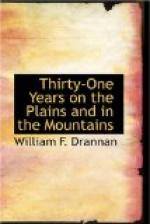I crawled up as near their camp as I dared to go, and watched them until about nine o’clock that night, at which time a number of them had turned in, apparently for the night, and a number were around their horses all the time, giving us no opportunity whatever, to stampede them, which was my intention, provided they gave us the least show. I told my assistants there would be no danger whatever, until daybreak the next morning, and we would return to camp and sleep until near daylight.
When we got to the train Jim had not gone to bed yet. I told him where we had located the main band, and as near as I could the number of the Indians—about one hundred and fifty—but that I did not anticipate any trouble during the night.
Jim said he would sit up until four o’clock the next morning. “At which time,” said he, “I will call you and you can take as many scouts with you as you like and watch every move made by the Indians, and if they start this way telegraph me at once and I will have everything in readiness to receive them, and I think we will be able to give them quite an interesting entertainment.”
What we meant by the term telegraphing was sending a messenger as fast as he could ride, as there were no other means of transmitting messages quickly.
The next morning at four, sharp, Jim woke us up. He had our horses there, ready to saddle.
I sent three scouts north of the trail, three south and took the other two with me to look after the Indians.
We arrived at the place where we had been secreted the evening before, just as the Indians were breaking camp. They started toward the road, and I watched them till they struck the road and headed toward the train.
I then dispatched one of my assistants to the train, which was nearly four miles distant, telling him to spare no horseflesh, but make the trip as quick as his horse was able to carry him and notify Jim of the Indians’ movements. The other scout and I stayed to watch the Indians. They traveled along the road at their leisure until they got in sight of the train, but Jim had all in readiness for them. He had raised the tongues of the two lead wagons—which in forming a corrall always stood face to face— about six feet high and had the nine scalps we had taken the day before, strung on a line and swung under the wagon tongues so as to be readily seen by the Indians. As soon as the Indians came in sight of the train he had all the men form in single line on the outside of the corrall, while all the women and children and all the stock were on the inside.
They circled around the entire train, taking in the situation but keeping out of gunshot. Seeing that the emigrants, much to their surprise, were ready to receive them, and seeing no chance to stampede their stock, they rode off on the hillside about half a mile away and held a council for about half an hour, after which they all mounted and rode away. They were not disposed to tackle a greater number than they had, especially when their antagonists were armed with guns, while they had only bows, and arrows, and tomahawks.




